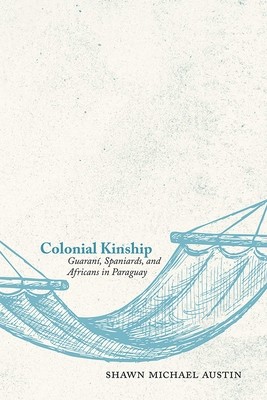
- We will send in 10–14 business days.
- Author: Shawn Michael Austin
- Publisher: University of New Mexico Press
- ISBN-10: 082636196X
- ISBN-13: 9780826361967
- Format: 15.2 x 22.9 x 2.5 cm, hardcover
- Language: English
- SAVE -10% with code: EXTRA
Reviews
Description
Winner of the 2021 Bandelier/Lavrin Book Prize from the Rocky Mountain Council for Latin American Studies
In Colonial Kinship: GuaranÃ, Spaniards, and Africans in Paraguay, historian Shawn Michael Austin traces the history of conquest and colonization in Paraguay during the sixteenth and seventeenth centuries. Emphasizing the social and cultural agency of GuaranÃ--one of the primary indigenous peoples of Paraguay--not only in Jesuit missions but also in colonial settlements and Indian pueblos scattered in and around the Spanish city of Asunción, Austin argues that interethnic relations and cultural change in Paraguay can only be properly understood through the Guaranà logic of kinship. In the colonial backwater of Paraguay, conquistadors were forced to marry into Guaranà families in order to acquire indigenous tributaries, thereby becoming "brothers-in-law" (tovajá) to Guaranà chieftains. This pattern of interethnic exchange infused colonial relations and institutions with Guaranà social meanings and expectations of reciprocity that forever changed Spaniards, African slaves, and their descendants. Austin demonstrates that Guaranà of diverse social and political positions actively shaped colonial society along indigenous lines.
EXTRA 10 % discount with code: EXTRA
The promotion ends in 15d.07:45:35
The discount code is valid when purchasing from 10 €. Discounts do not stack.
- Author: Shawn Michael Austin
- Publisher: University of New Mexico Press
- ISBN-10: 082636196X
- ISBN-13: 9780826361967
- Format: 15.2 x 22.9 x 2.5 cm, hardcover
- Language: English English
Winner of the 2021 Bandelier/Lavrin Book Prize from the Rocky Mountain Council for Latin American Studies
In Colonial Kinship: GuaranÃ, Spaniards, and Africans in Paraguay, historian Shawn Michael Austin traces the history of conquest and colonization in Paraguay during the sixteenth and seventeenth centuries. Emphasizing the social and cultural agency of GuaranÃ--one of the primary indigenous peoples of Paraguay--not only in Jesuit missions but also in colonial settlements and Indian pueblos scattered in and around the Spanish city of Asunción, Austin argues that interethnic relations and cultural change in Paraguay can only be properly understood through the Guaranà logic of kinship. In the colonial backwater of Paraguay, conquistadors were forced to marry into Guaranà families in order to acquire indigenous tributaries, thereby becoming "brothers-in-law" (tovajá) to Guaranà chieftains. This pattern of interethnic exchange infused colonial relations and institutions with Guaranà social meanings and expectations of reciprocity that forever changed Spaniards, African slaves, and their descendants. Austin demonstrates that Guaranà of diverse social and political positions actively shaped colonial society along indigenous lines.


Reviews